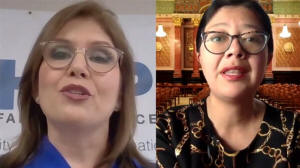|
House Bill 2775 and Senate Bill 2492 are a pair of identical
bills which aim to create additional legal defenses for renters
and protections against discrimination based on source of
income, as well as preventing undue administrative burdens when
applying for housing assistance.
Sanguinetti, a Republican who served with former Gov. Bruce
Rauner, is now executive director for HOPE Fair Housing Center
in Wheaton. She said the bills would begin to “move the needle”
on fair housing and civil rights issues in the state.
“The most likely victims of source of income discrimination are
single woman-led households who receive income like alimony,
child support, or rent assistance. Households in which one or
more persons has a disability, and receive (Supplemental
Security Income) or (Social Security Disability) or rent
assistance,” Sanguinetti said.
Ford, D-Chicago, who is the chief sponsor of the bill in the
House, said discrimination against renters based on social
security and disability income disproportionately targets
communities of color.
“Social Security Disability payments or child support source
income discrimination is often, we've learned, a proxy for
racial discrimination with Black and Latinx households, (who
are) more likely to have their income scrutinized or denied by
housing providers,” Ford said.
Proponents of the bills also said the COVID-19 pandemic has
highlighted issues in affordable housing inequities,
highlighting the need for additional action by the state to
protect low-income renters.
Villa, D-West Chicago, cited data from the National Council for
State Housing Agencies which found that more than 540,000
Illinois households could not pay rent as of September 2020, and
the backlog of owed rent in the state as of January of this year
totaled over $1.2 billion.
“Our state has already been facing (an) affordable housing
shortage before the pandemic and families are desperate for
help,” Villa said. “This is extremely difficult as you can only
imagine when families are trying to make sure they have a roof
over their head.”
“Inequities in housing are worsening as the pandemic continues,”
she added.
Michelle Gilbert, legal director of the Lawyers’ Committee for
Better Housing, said offering additional support and legal
protections for tenants would be essential to avoiding a
widespread housing and eviction crisis if moratoriums on
pandemic-related evictions are lifted this summer.
“It's not just the short-term preventing homelessness that's
important, but for the economy of the state overall, it's
important that those tenants don't carry with them long-term
rental debt,” Gilbert said.
Gilbert said rental assistance could help prevent a housing
crisis, although the organization was preparing for such a
scenario.
“But what I'm really hoping is that we don't see a mortgage
foreclosure crisis between the money that's been available for
mortgage foreclosure relief, as well as all of the emergency
rental assistance,” she added.
Capitol News Illinois is a nonprofit, nonpartisan
news service covering state government and distributed to more
than 400 newspapers statewide. It is funded primarily by the
Illinois Press Foundation and the Robert R. McCormick
Foundation.

|
|




